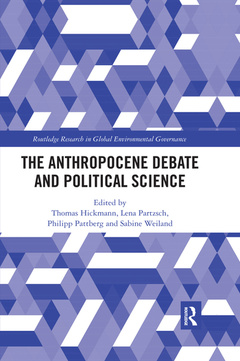Description
The Anthropocene Debate and Political Science
Routledge Research in Global Environmental Governance Series
Coordinators: Hickmann Thomas, Partzsch Lena, Pattberg Philipp, Weiland Sabine
Language: English
Subjects for The Anthropocene Debate and Political Science:
Keywords
Anthropocene Debate; Thomas Hickmann; Earth System Governance; Lena Partzsch; Planetary Boundaries; Philipp Pattberg; Anthropocene Discourse; Sabine Weiland; Global Climate Governance; Anthropocene; Anthropocene Concept; geological epoch; Great Acceleration; environmental governance; IR Theory; environmental politics; Planetary Boundaries Concept; environmental security; Human Nature Relations; environmental ethics; Earth System Governance Project; environmental policy; SIA; Anthropocene Thinking; UNFCCC Secretariat; Global Environmental Governance; Maike Weißpflug; Classical IR Theory; Johannes Lundershausen; High Level Radioactive Waste; Basil Bornemann; Earth System Science; Franziska Müller; Anthropocene Working Group; Judith Nora Hardt; Environmental Policy Integration; Lukas Hermwille; Agricultural Governance; Chris Höhne; Multi-level Global Governance; Sandra Schwindenhammer; Anthropocene Narrative; Till Hermanns; Gm Insect; Qirui Li; Environmental Security Literature; Dörte Themann; Achim Brunnengräber; Jens Marquardt; Jörg Tremmel
Publication date: 05-2020
· 15.6x23.4 cm · Paperback
Publication date: 09-2018
· 15.6x23.4 cm · Hardback
Description
/li>Contents
/li>Readership
/li>Biography
/li>
Anthropocene has become an environmental buzzword. It denotes a new geological epoch that is human?dominated. As mounting scientific evidence reveals, humankind has fundamentally altered atmospheric, geological, hydrological, biospheric, and other Earth system processes to an extent that the risk of an irreversible system change emerges. Human societies must therefore change direction and navigate away from critical tipping points in the various ecosystems of our planet. This hypothesis has kicked off a debate not only on the geoscientific definition of the Anthropocene era, but increasingly also in the social sciences. However, the specific contribution of the social sciences disciplines and in particular that of political science still needs to be fully established.
This edited volume analyzes, from a political science perspective, the wider social dynamics underlying the ecological and geological changes, as well as their implications for governance and politics in the Anthropocene. The focus is on two questions: (1) What is the contribution of political science to the Anthropocene debate, e.g. in terms of identified problems, answers, and solutions? (2) What are the conceptual and practical implications of the Anthropocene debate for the discipline of political science?
Overall, this book contributes to the Anthropocene debate by providing novel theoretical and conceptual accounts of the Anthropocene, engaging with contemporary politics and policy-making in the Anthropocene, and offering a critical reflection on the Anthropocene debate as such. The volume will be of great interest to students and scholars of political science, global environmental politics and governance, and sustainable development.
List of Figures
List of Tables
Notes on Contributors
Acknowledgements
1. Introduction: A Political Science Perspective on the Anthropocene
Thomas Hickmann, Lena Partzsch, Philipp Pattberg and Sabine Weiland
I Theories and Concepts
2. A Natural History for the 21st century: Rethinking the Anthropocene Narrative with Arendt and Adorno
Maike Weißpflug
3. Disentangling Descriptions and Responses to the Anthropocene: Norms and Implications of Scientific Representations of the Earth System
Johannes Lundershausen
4. The Anthropocene and Governance: Critical Reflections on Conceptual Relations
Basil Bornemann
5. International Theory in the Anthropocene: Moving beyond Species, State, and Governance
Franziska Müller
II Governance and Practices
6. Security Studies and the Discourse on the Anthropocene: Shortcomings, Challenges, and Opportunities
Judith Nora Hardt
7. Global Climate Governance as Boundary Object: Making the Meaning of the Anthropocene
Lukas Hermwille
8. From ‘Talking the Talk" to "Walking the Walk"? Multi-Level Global Governance of the Anthropocene in Indonesia
Chris Höhne
9. Agricultural Governance in the Anthropocene: A Research Agenda
Sandra Schwindenhammer
III Critical Perspectives and Implications
10. Sustainability Impact Assessment of Land Use Changes in the Anthropocene
Till Hermanns and Qirui Li
11. The Nuclear Legacy in the Anthropocene: Interrelations between Nature, Technology, and Society
Dörte Themann and Achim Brunnengräber
12. Worlds Apart? The Global South and the Anthropocene
Jens Marquardt
13. The Anthropocene Concept as a Wake-Up Call for Reforming Democracy
Jörg Tremmel
14. Conclusions: Towards a ‘Deep Debate’ on the Anthropocene
Thomas Hickmann, Lena Partzsch, Philipp Pattberg and Sabine Weiland
Index
Thomas Hickmann is a Post-Doctoral Researcher and Lecturer at the Faculty of Economics and Social Sciences of the University of Potsdam in Germany.
Lena Partzsch is a Professor of Environmental and Development Policy at the University of Freiburg in Germany.
Philipp Pattberg is a Professor of Transnational Environmental Governance and Policy at Vrije Universiteit Amsterdam in The Netherlands.
Sabine Weiland is an Associate Professor of Political Science at Lille Catholic University, affiliated with the European School of Political and Social Sciences (ESPOL) in France.




